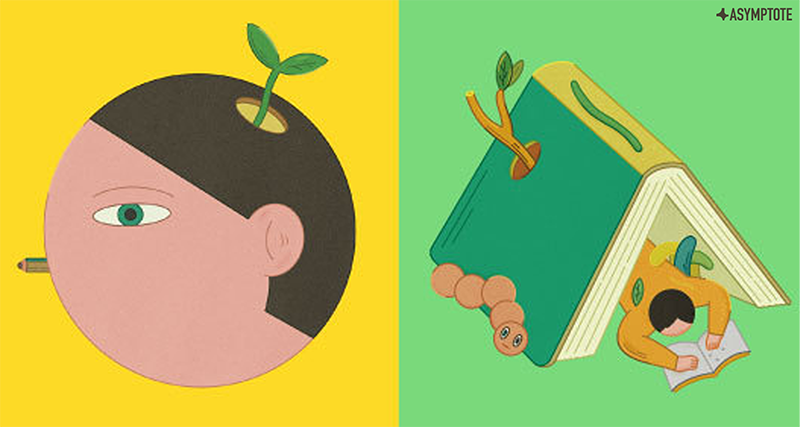For its thirty-third edition this year, the Taipei International Book Exhibition (TiBE) filled a hall of the Taipei World Trade Center from February 4 to 9. The exhibition’s theme—「閱讀異世界」 ‘Follow Your Fancy in Reading’—celebrated the「異」or the ‘other’ in global literature, drawing authors from as far as Italy (this year’s guest of honour) and Czechia, and as near as Japan and Hong Kong. Asymptote’s Senior Assistant Editor for fiction, Michelle Chan Schmidt, was one of the translators, editors, publishers, and readers who flocked to the fascinating six-day event to learn more about Taiwanese literature in translation.
Alongside the meticulous preparations of lóo-bah and bah-sò rice, yamagawa pot, or the Taiwanese iterations of yōshoku curry, translation is one of the crafts in Taiwan Travelogue that combine to give Yáng Shuāng-zǐ’s novel the complexity and richness of a twelve-course feast. When our Japanese narrator Aoyama Chizuko arrives in Taiwan—a then-Japanese colony—in 1938, Ông Tshian-hóh, also known as Ō Chizuru or Chi-chan, is the young local woman assigned to serve as her Taiwanese interpreter. It takes only a quarter of the meticulously structured novel for Chizuko, increasingly enraptured with Chi-chan, to realize her hidden dream: ‘Wait, I know what your ambition is! It’s to become a professional translator—of novels, isn’t it?’
On the opening day of the Taipei International Book Exhibition, Yáng and Taiwan Travelogue’s translator, Lin King, spoke at length in Mandarin about the layers of translation saturating this brilliant novel, beginning with its ‘translate-ception’ structure: Yáng’s narrative masquerades as an original piece of 1930s Japanese travel writing that her authorial persona purports to have translated into Taiwanese Chinese. To write the novel, Yáng and her sister delved into the immense archives concerning the Japanese colonization of Taiwan from 1895 to 1945, which enabled them to filter Taiwan Travelogue through Chizuko’s Japanese eyes. It was a kind of pain, says Yáng, to not be able to write in a Taiwanese voice in the novel. READ MORE…





